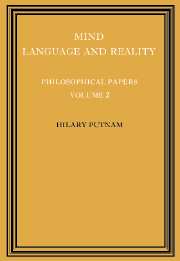Book contents
- Frontmatter
- Contents
- Dedication
- Introduction
- 1 Language and philosophy
- 2 The analytic and the synthetic
- 3 Do true assertions correspond to reality?
- 4 Some issues in the theory of grammar
- 5 The ‘innateness hypothesis’ and explanatory models in linguistics
- 6 How not to talk about meaning
- 7 Review ofThe concept of a person
- 8 Is semantics possible?
- 9 The refutation of conventionalism
- 10 Reply to Gerald Massey
- 11 Explanation and reference
- 12 The meaning of ‘meaning’
- 13 Language and reality
- 14 Philosophy and our mental life
- 15 Dreaming and ‘depth grammar’
- 16 Brains and behavior
- 17 Other minds
- 18 Minds and machines
- 19 Robots: machines or artificially created life?
- 20 The mental life of some machines
- 21 The nature of mental states
- 22 Logical positivism and the philosophy of mind
- Bibliography
- Index
7 - Review ofThe concept of a person
Published online by Cambridge University Press: 12 January 2010
- Frontmatter
- Contents
- Dedication
- Introduction
- 1 Language and philosophy
- 2 The analytic and the synthetic
- 3 Do true assertions correspond to reality?
- 4 Some issues in the theory of grammar
- 5 The ‘innateness hypothesis’ and explanatory models in linguistics
- 6 How not to talk about meaning
- 7 Review ofThe concept of a person
- 8 Is semantics possible?
- 9 The refutation of conventionalism
- 10 Reply to Gerald Massey
- 11 Explanation and reference
- 12 The meaning of ‘meaning’
- 13 Language and reality
- 14 Philosophy and our mental life
- 15 Dreaming and ‘depth grammar’
- 16 Brains and behavior
- 17 Other minds
- 18 Minds and machines
- 19 Robots: machines or artificially created life?
- 20 The mental life of some machines
- 21 The nature of mental states
- 22 Logical positivism and the philosophy of mind
- Bibliography
- Index
Summary
It is strikingly apparent that the twentieth century has been a golden one for the sort of philosophy that is logically and empirically oriented. Merely to list the names of the analytical philosophers who have achieved greatness or near-greatness in this century is to provide impressive evidence of this: Russell and Wittgenstein (who stand on a level by themselves); G. E. Moore (whose influence Keynes described so well in the lovely memoir ‘My Early Beliefs’); F. P. Ramsey (also memorialized by Keynes); Carnap and Reichenbach; John Austin; and – to take the risk of mentioning some philosophers in mid-career – W. V. Quine and Nelson Goodman. The writings of these men have illuminated field after field of philosophy: ethics (Moore); mathematical philosophy (Russell, Wittgenstein, Quine); epistemology and philosophy of science (all of the figures mentioned). The nature of moral valuation; of natural laws; of mathematical necessity; the nature of language and its relation to reality; of truth and meaning; of common sense knowledge and of scientific knowledge; and above all, the nature of philosophy itself, have been the subject of essays and books as brilliant, as full of insights and surprises (including surprising mistakes, naturally) as any produced in the entire history of philosophy. If any further evidence were needed of the healthy state of philosophy today, it would be provided by the hordes of intellectuals who complain that philosophy is overly ‘technical’, that it has ‘abdicated’ from any concern with ‘real’ problems etc.
- Type
- Chapter
- Information
- Philosophical Papers , pp. 132 - 138Publisher: Cambridge University PressPrint publication year: 1975



